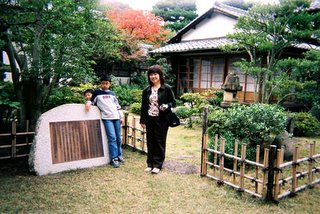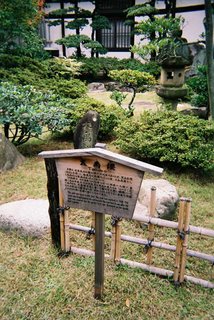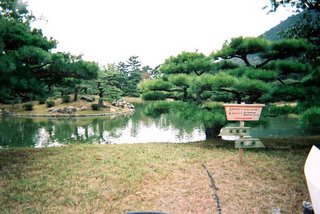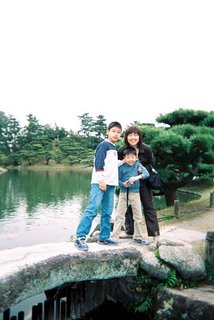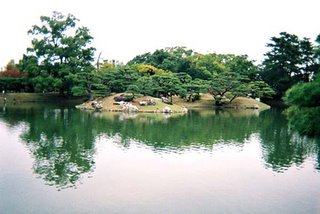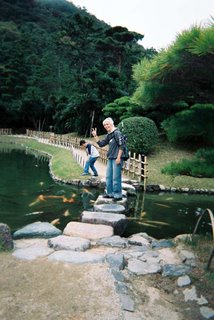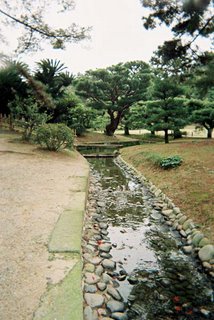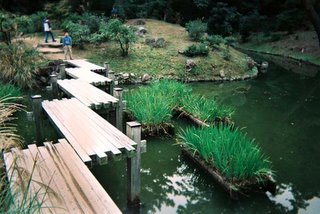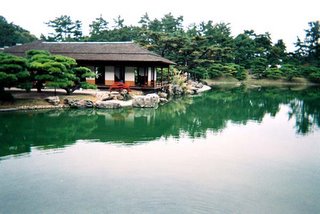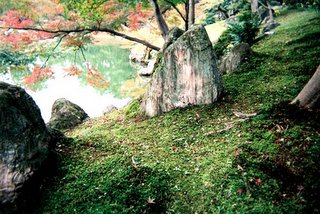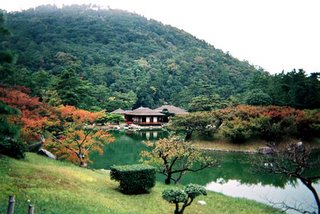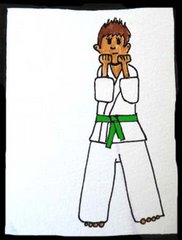A few weeks ago, in the torment of a nasty cold, I drove up the coast in search of fresh sea air to blow the siege of snot from between my ears. It was a beautiful autumn day, colours spread across the mountains that Japan is famous for, lit up with delicate rays of sunshine to their best advantage.
However I diverge from the true point of my story, to get sharply to the point; on the way back I saw mastheads in the distance, a multitude of masts and stays rolling with the faint swell. You cannot imagine my excitement. Before coming here one of my primary goals was to learn to sail in Japanese, a goal that has so far proved elusive, with only the temptation of empty leads to raise my blood pressure.
I drove in the general direction and came across a swanky building with maybe 50 or so vessels stationed on the hardstand in her lee, with another 20 or 30 or so tethered to the floating docks. A real yacht club, though somewhat deserted.
I ventured inside in search of someone, anyone, who might know how to plant me on a boat. I followed a sign that said information, helpfully in English, up the stairs to an empty vestibule. Looking around I spotted a lone woman working in an office and I proceeded to loiter with intent, finding the courage to approach her vanish. Presently she came out, looked at me questioningly and may have said something for all I can remember.
I stammeringly introduced myself, said I was from Australia, sailed in Melbourne, and was currently living here. Though I may be giving myself too much credit for how much information I actually imparted successfully. However, having made it through the necessary formalities, the next bit was the most important. That week I had been studying the –tai verb conjugation. There being no verb for ‘to want to do’ that I have yet discovered, my understanding is that one conjugates the verb to the –tai form and it infers a want to do that verb.
“Watashi wa sayringu o shitai.” I want to do sailing, I ventured. It worked. She understood. Then came the tricky bit. I got a full-length reply about something or other that was met by a blank face on my part. “Racingu o arimasuka.” Do you have racing, I tried next, and congratulated myself heartily for understanding something about how it being wintertime they weren’t racing now but would be again in spring. I offered my stock standard response that I was very sorry but only spoke a little Japanese but am studying very hard, or something like that, unfairly leaving it to her to make the next conversational play. At which point she did something very Japanese: excused herself and ran off to find somebody else who might be able to help!
She came back and took my phone number. I thought that would be the last of it and vowed to come back in the spring when there might be some racing going on. However, a couple of days later, I received a phone call from a man introducing himself as Minami San. We had an interesting conversation until I made my usual apology for my bad Japanese, at which point he confessed he could speak a little English, which made things so much easier. I was being invited to go sailing with him and some friends, two weeks hence, to an island to spend the night and then return the next day. More details than this I was unable to attain, however I effusively accepted and spent the next couple of days in a funk as to how I was going to get out of work.
Chucking a sickie would be the most obvious option, however, currently sick and having taken a couple of mornings off work, it would be less than plausible. Knowing the nature of my boss, being caught in a lie would be inexcusable. There was nothing for it but to pick my timing and rely on her generosity, hoping she understood how badly I needed to go sailing. I gambled well. Nettie helped me ring Minami San back, ascertained the time we would be leaving and what I would need, and told him I would be there. I would have time to teach my Saturday morning classes and could go to the boat to meet Minami San from there. She would deal with my afternoon classes.
Yippee! I was finally going sailing.
There are yachties and there are people who own boats. Until last weekend I never realised how great that gulf can be. I’ve been extremely lucky to have known some exceptional and experienced sailors. I’ve also met some interesting characters whose acquaintance has provided some challenges.
Put two yachties together and they will talk about nothing but sailing, boats, tactics, efficiency, engine repairs, sail repairs, hull repairs, equipment, destinations, the weather, marina costs and conditions. It constantly amazes me the variety of conversations possible connected with sailing. The only exception to this rule I’ve ever witnessed was during the Rugby World Cup. We were in Malaysia, a couple hundred sailors and ninety percent of the fleet was English or Australian. Naturally some strong rivalries came to the fore and sailing was forgotten for a couple of hours. Even I got into some heated barracking!I never pretend to know more than the first thing about sailing. However I know how to get a boat from point A to point B, when to keep my mouth shut and when it’s okay to ask questions. I’m also often the lightest and nimblest person on a yacht. This makes me useful. Weight distribution is important, especially when racing. I get sent forward in rough seas to unhitch the snag, up the mast, preferably not in rough seas, and pushed off the boat to clamber or leap onto a shaky landing pier to secure lines. I like this. It means that I get sent forward before Dave, the experienced foredecky, because he’s 40kgs heavier than me. A boat is the only place where it’s not offensive to get asked your weight.
I arrived at the marina shortly before the appointed time and did some more loitering with intent. Standing in front of the docks I hoped someone would spot the obvious gaigin with blonde hair and come racing over to introduce themselves. All I did was attract a few suspicious glances. Just after twelve I headed back up to the “information”, hoping someone would know who Minami San was. It turned out they did; he worked there, though wasn’t in today, and didn’t seem to be expected, but I didn’t know how to ask if he was coming though not working. I started to panic. However someone appeared who knew something of the affair and I was taken to meet a friend of Minami San who was to take me sailing.
All along, from first being invited, I was never sure how many people were going on this excursion. It sounded like a few, but this was all supposition. I was led down the dock to one of the more expensive yachts in the harbour. A beautiful cruising vessel, just over 40” long, built for a retired couple to sail around the world in, with minimum hardship. I was introduced to Mura San and the owner, who asked me to call him Shin San, though all his friends I later met, called him Naka San. One of the many puzzles I never worked out.
To board someone else’s boat, without being asked, is the height of rudeness. So I stood on the dock waiting for an invitation, whilst they looked at me like I was an idiot for not climbing aboard.My bag was heaved on board, which they remarked was very heavy. I had my wet weather gear inside and two complete changes of clothes. I’m used to sailing on Port Phillip Bay which gets rough, and in the wrong mood the ocean dumps buckets of Antarctic seawater down your neck every minute or so. I was expecting to be quizzed later about sailing in Australia so I didn’t offer an explanation at this point. My dictionary was in my bag, which I’d just been separated from.
We filled up with fuel and motored out the harbour. I was shown over the boat, given my own cabin and offered a beer. I was introduced to peanuts and asked if I’d eaten them before! I pulled out the fruit and Pringles I’d brought along as a contribution, but left the bottle stashed in my bag for a time more appropriate. Going sailing with people for the first time is always awkward, however things were looking up. However it seemed odd that beer was a greater priority than getting the sails hoisted. I’d already donned my sorely neglected sailing gloves, checked over the rigging, found the main halyard and thought it odd that though the cabin and woodwork were immaculate, the sails and sheets at first glance seemed old and tatty.
Over beer I was shown the chart, happily in English and Japanese. Where we had left, were going, our current position and where I lived were all pointed out to me with many accompanying “sooo desu ne”s on my part, agreeable interruption being a common facet of Japanese conversation. It would take 2.5 to 3 hours to reach our destination. That chart was to come out every five minutes or so for the rest of the voyage, GPS position taken and points precisely plotted. I looked longingly at the sails and the end of the peninsular we were sailing alongside that was sheltering us somewhat from the wind. We must be waiting to get out of the wind shadow before setting sail, I thought reflectively.
I was asked if I had had lunch. I hate trick questions like that. I had snacked beforehand, so I would be prepared to eat or not eat. Eventually it was ascertained that they had not eaten either and I was offered ramen, cup noodles. I happily accepted and my offers to help were rejected. So I sat on deck sipping the last of my beer and looking at the bare mast. I rejected the proffered fork and spoon, asked for o-hashi and was later complimented on my use of chopsticks. For some reason that always bugs me. Maybe because it happens every time I eat in public. I want to start complimenting Asians on their use of knives and forks. Its like being asked if I eat bread or rice. Japanese truly think Westerners live on sandwiches and hamburgers.
Small talk was had. Both men were over 60 and retired. Mura San spoke pretty good English and had little patience for letting me practice my Japanese. I found out that Shin San, the owner of this rather expensive boat, was previously, as Mura San phrased it, the head policeman in Kagawa Ken. A ken or prefecture in Japan is similar to a state in Australia or the US. A quiet demure man in his pristine Helly Hansen sailing clothes, he didn’t look capable of kicking in the necessary heads to get to a position like that.
I finally asked when we would hoist the sails. I was told the wind was blowing in the wrong direction; as we were sailing directly into the wind we would be motoring the whole way. My stomach contracted several sizes as the imaginary fist buried itself within. I felt like vomiting bitterness and didn’t know whether to laugh in derision or cry. That explained the ropes that were frayed where they had been continually flogging against the safety rails. That explained so much I didn’t want to know.
A few weeks earlier I had been overjoyed and puzzled at seeing two yachts out on the sea near my house. Neither yacht had its sails raised. I live at the mouth of Dokigawa, Doki River. It flows into the Seto Ohashi Inland Sea that separates Shikoku, Kyushu and Honshu, three of the four main islands of Japan. Guidebooks describe the Seto Ohashi as one of the most beautiful pieces of water in the world. Personally I’d rank it below the Andaman Sea and Halong Bay, but it leaves Sydney Harbour for dead. Right at the mouth of Dokigawa there is a small island. I go running out there along the water and dream of taking a small dhingy around the island. The Seto Ohashi is one big archipelago of such islands of differing sizes. Winds blow across her at about 5-10 knots with gusts up to 15. Once when it was really windy I saw white caps out there. Otherwise it’s as flat as my local swimming pool. The sort of conditions Savage would kick arse in. Savage was the boat I crewed on in Melbourne. Too light for heavy seas she was at her happiest with 7 knots of wind and a flat bay. We would cream the rest of the fleet on afternoons like those.
One cannot sail closer than 45 degrees into the wind. So one zig zags along turning 90 degrees across the wind slowly going in a round about way towards the wind. Yacht races are designed to make one sail into the wind to test skill. One doesn’t go sailing in order to arrive at a destination any more than long distance runners are concerned with the final locale. A destination is purely an excuse to do what you love.
Sailing conditions on the Seto Ohashi are close to perfect. So many days I have ridden over the bridge, looked out on this sea and yearned to be on a boat, feeling the play of the wind in the sails. Here I was, on that boat, but with no sails to play with. Because the wind was blowing in the wrong direction. I wanted to jump ship that very minute and swim to shore. We were still alongside the peninsular. It was less than a kilometre away. The sea was flat. I could make it!
We motored into a little fishing harbour on the isle of Shiraishi. A gorgeous place, Shin San and I took a walk around. There were few cars; tiny alleyways flanked by traditional houses and mountains on the west side stretching up to shelter the hamlet from the worst of the weather. Mandarins covered trees in front courtyards and we bought a bag for 100 yen. A tiny idyll. On the way back to the boat Shin San wondered if the other boat had arrived yet. Ahh another boat. This was the first of it. We were all to go out to dinner together at a minshuku on the beach at the next cove.
I had been dreading this moment. On the car all the way up to the boat I had been considering my vegetarian status. I have a policy when overseas of compromising my vegetarianism if it would be rude or culturally insensitive not to. This was one of those times. I still wanted to impress these men. They might have friends who liked sailing even if they were more into the image than the practice. We made our way to the restaurant and a lot of alcohol was brought out. They were sailors in that respect anyway! The meal was all fish. Weird bits of seafood and sashimi (raw fish) were brought out. I downed my first beer very quickly hoping to find some courage to eat in the bottom of the glass.
We ate and we drank and we laughed and they took photos of the gaigin to put in their club newsletter. The non-sailing almost didn’t matter. And then we went back to the boat and I crashed out in my private cabin. Unfortunately I woke some hours later to find my stomach fighting with the seafood I had forced inside it. I had forgotten how much effort it took to cleanse my body of the Mongolian mutton. I was very, very sick. The alcohol didn’t help much either.
The next morning I slept in, my body exhausted from throwing up quietly all night. I politely refused breakfast, wanting to rest my poor overworked stomach. We went for a walk that turned into a hike up the mountains and witnessed beautiful views. I was left pretty much to myself, which was fine by me. I was much happier soaking in the breeze and the sunshine than struggling with language.
On the return journey the wind was blowing in the ‘right’ direction and my paranoid self was wondering if I was being punished for not being able to hold my alcohol as they clearly saw it. Trying to explain otherwise would sound lame and in the light of day I had less need for these men’s approval. I retreated forward, pulled out my iPod and tried to enjoy the ride.
The other yacht raised a main sail and I excitedly glanced back to the cockpit to see if we would do likewise. Shin San merely pulled out his GPS and checked our position, though it was blatantly obvious in which direction we were going. As I wondered why the other yacht hadn’t raised a jib (the second front sail that funnels the wind into a high pressure system that pulls the main sail and the boat forward) they did so and I watched it flap about, badly trimmed, for ten minutes or so until they gave up and yanked it down.
Back in the pens at Neo Cho, the boys said “sayonara”, literally, didn’t help with my bags and I didn’t glance back as I walked to my car. The next day in the supermarket I had to walk through the extensive fish department and I nearly threw up all over again. I think my cravings for seafood have been well and truly cured. As for my cravings for sailing, they will have to wait until xmas when I’m coming home to see my mum and sister, my half share of a laser dhingy and a beautiful lake.
Sunday, December 18, 2005
Thursday, December 01, 2005
Ritsurin Koen
SUPER DODGEBALL
At the beginning of kindergarten and grade one classes, we always ask the kids a bunch of questions: what animal do you like? What food do you like? What sportusu do you like? – hamtaaro, peeza, dodge ball. I’m never sure about the last one. Does it really qualify as a sport? Will we see it in the Beijing Olympics?
But then one cold rainy weekend I’m trying to stomach the daikon soup – a Japanese style turnip – I’ve just made, flicking channels on my old TV, itself constantly flicking between green and colour, and there it is! Okay, Japanese TV is famous for its craziness, though all I ever seem to find are bad soap operas (okay, an obvious oxymoron), baseball, news I don’t understand, baseball and more soap operas.
But SUPER DODGEBALL could save my starved intellect. I’m guessing it’s not big yet as they are still explaining the rules at the beginning of the programme. They never do that with baseball, though in true I’ve never lasted more than 28 secs into a game of baseball. They don’t even have seagulls on the pitch.
Okay, SUPER DODGEBALL; two opposing teams, two balls, 5 starting players on each team. The aim, as far as I could see, is to beat the crap out of an opponent with a ball a touch smaller than a volleyball, which can be held in a large palm. After flinging all your weight behind this ball in the direction of said opponent, if you succeed in a direct hit, they are eliminated. Sayonara. However, if they manage to catch this hurtling piece of leather, they get an extra player brought onto their team. Double however, if you target your unlucky opponent in the head, you get an extra player. When all players are eliminated from one team, the other team wins. Obvious really!
Funniest home videos would pay a fortune for the slo-mo instant replay of this woman getting smacked in the side of the cheek. George Bush should fight wars this way and trade all his weapons stock for shares in CNN. Ratings would skyrocket if you had a bunch of guys out in the desert hurling leather balls at each other. It could be the new chess. Even I’d sign up if I got a free education in exchange for an afternoon of getting my brains pulped out. Cheaper than karate classes and more exciting than uranium coated bullets. And there’s always the chance of a late comeback. Maybe George would even think twice about going to war if there was a chance of a fair fight.
So start up a local club and petition your friendly local Olympic official to include the sport at Beijing. Definitely more entertaining than synchronised swimming.
But then one cold rainy weekend I’m trying to stomach the daikon soup – a Japanese style turnip – I’ve just made, flicking channels on my old TV, itself constantly flicking between green and colour, and there it is! Okay, Japanese TV is famous for its craziness, though all I ever seem to find are bad soap operas (okay, an obvious oxymoron), baseball, news I don’t understand, baseball and more soap operas.
But SUPER DODGEBALL could save my starved intellect. I’m guessing it’s not big yet as they are still explaining the rules at the beginning of the programme. They never do that with baseball, though in true I’ve never lasted more than 28 secs into a game of baseball. They don’t even have seagulls on the pitch.
Okay, SUPER DODGEBALL; two opposing teams, two balls, 5 starting players on each team. The aim, as far as I could see, is to beat the crap out of an opponent with a ball a touch smaller than a volleyball, which can be held in a large palm. After flinging all your weight behind this ball in the direction of said opponent, if you succeed in a direct hit, they are eliminated. Sayonara. However, if they manage to catch this hurtling piece of leather, they get an extra player brought onto their team. Double however, if you target your unlucky opponent in the head, you get an extra player. When all players are eliminated from one team, the other team wins. Obvious really!
Funniest home videos would pay a fortune for the slo-mo instant replay of this woman getting smacked in the side of the cheek. George Bush should fight wars this way and trade all his weapons stock for shares in CNN. Ratings would skyrocket if you had a bunch of guys out in the desert hurling leather balls at each other. It could be the new chess. Even I’d sign up if I got a free education in exchange for an afternoon of getting my brains pulped out. Cheaper than karate classes and more exciting than uranium coated bullets. And there’s always the chance of a late comeback. Maybe George would even think twice about going to war if there was a chance of a fair fight.
So start up a local club and petition your friendly local Olympic official to include the sport at Beijing. Definitely more entertaining than synchronised swimming.
Marron Cake
Spongy stuff, fully packed with softness, in a delicate baking flavour. Best suitable for a sigh of relief at your tea break. Wrapped in the soft rays of the sun . . .
Camping with Dom
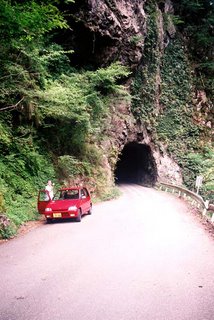
We headed out of Tokushima the next morning, heading southwest, towards the Pacific and some of Japan’s famed surf beaches. We had three nights and four days left before I had to be back at work. Plenty of time to make a circular trip of Eastern Shikoku, and chill out at the same time. Unfortunately, road trips in Japan can be alarmingly deceptive. What with narrow windy roads and a speed limit of 50km/h, which is rarely achieved, travelling a couple of hundred kilometres can take a whole day.
Then there was the problem of where to sleep. I’d gone shopping a couple of days earlier after being paid and bought a tent, eski, camping stove, the works. We had everything necessary for a car camping trip. However we spent much of that day driving, which is what Dom and I had both agreed we didn’t want to do. It was getting late and cooking in daylight was preferable. However I’d picked up some English maps in Tokushima and there were a handful of camping spots clearly marked. We found the first one only because several other campers were already set up. It was, in effect, a gravel carpark, right next to the road. Not quite what I had in mind. I was imagining a soft cushion of grass next to the beach, going to sleep with the waves roaring in the distance, sheltered from the wind by an accommodating bush. This wouldn’t do at all. So we left in search of a back road, somewhere we could hide and enjoy a restful sleep and a leisurely breakfast in the morning. However nothing seemed okay. And we were considering some pretty odd camping spots by this time. Eventually we found another carpark camping spot, but at least this one was next to the water and the rocks and we could wake up and see the ocean. I objected because I was sure my dream was just around the next corner, so we struck a deal that we would drive for another ten minutes, and if nothing eventuated we would come back here. Guess where we ended up setting up!
I’d offered to make dinner and began preparations. However, I had a wee tad accident. I lit my brand new camping stove after screwing the gas bottle on as tight as I was able. However, when I tested it and tried to turn it off, I couldn’t make the flame reduce, let alone go out. The next thing I knew the flames were getting bigger and I threw the whole thing as far as I could away from the campsite. Unfortunately, in my panic I didn’t take very careful aim and I managed to set alight a small shrub on the side of the mountain. By this time I was freaking out and yelling wildly to Dom for help. He said it took him a while to register that it was me making all the kafuffle and came back to find me rather excitedly trying to extricate the stove with a long stick. One of us kicked it away, I don’t quite remember whom, but by this time the thing was burning ferociously and starting to make a scary whistling noise. We did the sensible thing next – and ran like hell.
Not a moment to soon for just as we reached a safe distance away the stove broke the sound barrier; by speed or volume, I’m not too sure, but the mountain visibly shuddered, unless that was me collapsing in relief.
We adjourned for beer and considered what to do about dinner. There was a restaurant across the road, but on inspection it was shut. However, the flipside of nearly setting the mountain on fire was that there was an awful lot of dry wood and we were camping on gravel, so I’d have to be really stupid to make another mistake. At this stage though, my record wasn’t too good. Dinner proceeded without further mishaps, and as all camped dinners are, was pronounced oishi (delicious in Japanese).
The next day we headed up into the mountains. Around lunchtime we found my perfect camping spot. A disused road that headed down to a small bridge that ended abruptly on the other side. A creek tumbled and gurgled along the river pebbles, and I finally got my quiet time in the mountains, sitting Sidharta like for a long time having conversations with the shallow rapids.
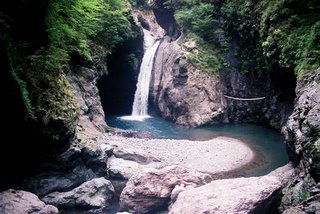 Japan is riddled with long tunnels stretching up to almost two kilometres. The longest one I’ve found was 1852m. On the way back to Kagawa Prefecture we came out of one of these and ran into a viewing platform overlooking a waterfall tumbling into a pristine swimming hole. We clambered down and dipped our feet into the deliciously icy water. The middle of summer I had been too hot for weeks and neither of us needed much encouragement to overcome bashfulness, strip off and plunge into the clear stillness. That was the last highlight of our trip. That night we ended up staying at a big campsite and eating dinner at a Korean restaurant. I had my first authentic bibimbop in a long time.
Japan is riddled with long tunnels stretching up to almost two kilometres. The longest one I’ve found was 1852m. On the way back to Kagawa Prefecture we came out of one of these and ran into a viewing platform overlooking a waterfall tumbling into a pristine swimming hole. We clambered down and dipped our feet into the deliciously icy water. The middle of summer I had been too hot for weeks and neither of us needed much encouragement to overcome bashfulness, strip off and plunge into the clear stillness. That was the last highlight of our trip. That night we ended up staying at a big campsite and eating dinner at a Korean restaurant. I had my first authentic bibimbop in a long time.
Awa Odori
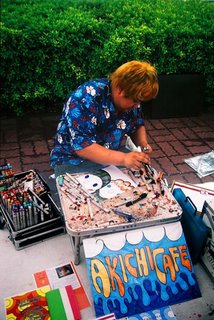
The dancing fools
And the watching fools
Are foolish the same
So why not dance?
We headed to the train station and the local gaigin help centre in search of accommodation leads and information about what was actually going on. Accommodation was scarce and festival inflation had taken hold that weekend. However we found a place to stash stuff and take a nap before the evening’s revelling began.
Before heading out to the hotel, Dom and I loitered around the train station and central market place, the epicentre of the buzz in the air. Troupes of dancers were holding half hourly performances in front of a big department store, the sales assistants roping off the audience viewing space in hopes that people might still come and shop in the midst of this hullabaloo. Staking out a spot I noticed a lone artist, set up on the pavement below drawing caricatures of passers by with an army of permanent textas at his side, standing to attention, waiting to be called into action. A few funky Japanese were gathered around, waiting to be drawn, watching his drawing. I grabbed Dom and we headed down to get a closer look and eventually got drawn ourselves. Me with rosy pink cheeks and Dom with a little yellow bird in his nest of hair.
The dancing was of a precise nature, a slow exaggerated walk, knees pulled up high, feet splayed out at 90 degrees to each other. It must have been hell on the thigh muscles doing this for hours at a time. The hands and arms were moving in an almost Balinese style, thumb and forefinger pinched together with all the other fingers elegantly stretched outwards.
It was the clothing that caught my attention. There were a number of outfits on display but one of the most striking, and popular, was a woman’s costume that consisted of a yukatta, a summer style kimono, with Japanese style sandals, geta, that have a rectangular heel at both the front and back, so they resemble little bridges. I’ve been told that these were originally designed for climbing up mountains, enabling one to get a proper foothold. Tabi, white socks imitating mit
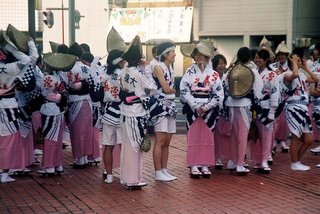 tens, with a separate toe for the big toe are worn inside. The headgear, for it cannot be truly called a hat, looked like a circular rattan mat that had been folded in half and tied under the chin with a ribbon. We watched for a while and then went off in search of the hotel for some kip before returning later, though we almost missed the festivities because my Japanese mistook the ending time for the starting time!
tens, with a separate toe for the big toe are worn inside. The headgear, for it cannot be truly called a hat, looked like a circular rattan mat that had been folded in half and tied under the chin with a ribbon. We watched for a while and then went off in search of the hotel for some kip before returning later, though we almost missed the festivities because my Japanese mistook the ending time for the starting time!We headed out about 8:30 and wandered into a transformed city. The lanterns lining certain streets heralded the spots most populated with dancers, but all over the city troupes of dances weaved their way through the narrow streets. The dancing was accompanied by shamisen (three stringed guitars), taiko (drums) and fue (flutes). It seemed the musicians had a harder time of it than the dancers but everyone sported their most excitedly demure smiles and the air held an abundance of static energy. The done thing seemed to be to watch a procession of dancers for a while and then wander off in search of the next group, which wasn’t hard as the mingled chants could be heard blocks away.
The energy was infectious, all traces of sleepiness disappeared and I couldn’t keep still, at times jumping up and down on the spot as if I’d had jumping beans for dinner! Everyone wore smiles, everyone was super friendly, as if the Japanese are friendly anyway, and I half ran half jumped around with an idiotic grin spread around my head, attracting more smiles in return which just made the grin wider! Along the streets vendors sold drinks, snacks and tacky souvenirs by the armload. After I couldn’t stand still and watch any longer, we grabbed beers and headed off in search of the next procession. A festival spread over a city is a tricky thing. There’s that feeling of being in the middle of everything, but never quite centred. Narrower alleyways held more intimate displays of music and dance, wider streets threw energy around but provided little space to utilise it among the thronging crowds. Around 10 o’clock the formalites became less so and spectators joined in the dancing revelries. Gaigin were especially popular and we soon had offers left right and upside down to join various groups, eventually weaving from one to another. There was a feeling that it was going to end soon though, a desperate effort to cram in as much fun as possible in the time left pervaded the atmosphere. Vendors started packing up their wares and dancers sat down for the first time in three days and nursed sore feet.
At 11 o’ clock, police vans circled and politely asked everyone to go home. And everyone did. This is the most famous Awa Odori festival in the country, situated in the middle of one of Japans most important holiday weeks, and they shut it down just when it was starting to get interesting. This habit of the Japanese to have a precise starting and ending time for any social event will never stop blowing me away!
Dom and I headed in the direction of the nearest combini and grabbed some more beer to take to a park. We ended up wistfully gazing out onto the docks of the local marina, telling sea stories and planning to buy a boat in which to sail around the world. I believe plans were made in the meantime to rent a yacht out of Phuket next summer and go cruising around the Andamans for a week. If anyone’s interested, we’re looking for a couple of crew, no experienced required, just a strong interest in chilling out!
Roadtrip[pin‘
One of my best friends came over to visit from Korea, where he’s been living for several years. Dom fed and housed me for six weeks whilst I looked for work in Seoul, so I figured it was time to pay back some big favours.
Still living with my boss at that stage, it was a good excuse to leave Kagawa and make true the title for this blog. A trip to the local sports store provided camping equipment, the local information bureaus provided a vague assortment of maps, and after practicing my Japanese on everyone I knew, by asking them their favourite place in Shikoku, we headed east, first stop Tokushima City and the famous Awa Odori Festival.
Of course, the first stop is never as intended and a whole host of ‘combini’s provided sumptuous snacking, whilst back roads tempted limitless distraction. Stopping to admire the mountains and bamboo forests, one of the first things noticed was the near decadence of the scarecrows working diligently in the paddies. Lifelike figures push wheelbarrows, bend over crops and sometimes ride bicycles; an admirable feat in a rice paddy! Many wear scary Japanese masks and all are outfitted with attention to detail, yet another example of the Japanese preoccupation with perfection. No Worzel Gummidges here.
Lifelike figures push wheelbarrows, bend over crops and sometimes ride bicycles; an admirable feat in a rice paddy! Many wear scary Japanese masks and all are outfitted with attention to detail, yet another example of the Japanese preoccupation with perfection. No Worzel Gummidges here.
 A windy road up a mountainside ended up at a Spirited Away style tunnel, which went nowhere. An incredibly creepy energy grew in the tunnel and Dom swears he saw something. We both got kinda spooked at about the same time and bailed rather quickly. It’s easy to see where Miyayashi gets his inspiration.
A windy road up a mountainside ended up at a Spirited Away style tunnel, which went nowhere. An incredibly creepy energy grew in the tunnel and Dom swears he saw something. We both got kinda spooked at about the same time and bailed rather quickly. It’s easy to see where Miyayashi gets his inspiration.
Another winding road led us to an abandoned house, perched on the edge of the mountain, commanding sumptuous views that would probably be snow-capped in winter. It was securely locked with all the belonging still inside, patiently waiting for the owners to return. Any other country and it would have been broken into and trashed long ago. Apparently there are many of these houses in Tokushima Prefecture, their owners long gone to the cities in search of profitable work. I’ve heard said houses may be bought for about 2 million yen if said owners can be tracked down. An interesting option for a mountain retreat. I’d only considered South East Asia before.
Hiking up the hillside, the territorial smell of macaques filled the nostrils. My cautionary fear of monkeys, engendered by vicious brutal Thai varieties, was quickly abandoned as we glimpsed arse after arse disappear into the bushes ahead of our arrival. I’m not sure about camping with packs of reasonably large monkeys around though. Maybe leave a pile of spiky chestnuts, of which they are especially fond, away from the campsite.
On arriving to Tokushima we encountered the maddest car park. A space where they load your car onto an elevator and stack it above a bunch of other cars. No driving involved. Just some crazy hydraulics. See picture below. Its like storage compartment for cars. Drive yours onto a lift and they take it away into the hemispheres above, and then file it in its own space. I was completely amazed. One spends so long in a country that you think nothing can truly surprise you any more and then you find a car park. Dom had to drag me away to the festival.
Its like storage compartment for cars. Drive yours onto a lift and they take it away into the hemispheres above, and then file it in its own space. I was completely amazed. One spends so long in a country that you think nothing can truly surprise you any more and then you find a car park. Dom had to drag me away to the festival.
Still living with my boss at that stage, it was a good excuse to leave Kagawa and make true the title for this blog. A trip to the local sports store provided camping equipment, the local information bureaus provided a vague assortment of maps, and after practicing my Japanese on everyone I knew, by asking them their favourite place in Shikoku, we headed east, first stop Tokushima City and the famous Awa Odori Festival.
Of course, the first stop is never as intended and a whole host of ‘combini’s provided sumptuous snacking, whilst back roads tempted limitless distraction. Stopping to admire the mountains and bamboo forests, one of the first things noticed was the near decadence of the scarecrows working diligently in the paddies.
 Lifelike figures push wheelbarrows, bend over crops and sometimes ride bicycles; an admirable feat in a rice paddy! Many wear scary Japanese masks and all are outfitted with attention to detail, yet another example of the Japanese preoccupation with perfection. No Worzel Gummidges here.
Lifelike figures push wheelbarrows, bend over crops and sometimes ride bicycles; an admirable feat in a rice paddy! Many wear scary Japanese masks and all are outfitted with attention to detail, yet another example of the Japanese preoccupation with perfection. No Worzel Gummidges here. A windy road up a mountainside ended up at a Spirited Away style tunnel, which went nowhere. An incredibly creepy energy grew in the tunnel and Dom swears he saw something. We both got kinda spooked at about the same time and bailed rather quickly. It’s easy to see where Miyayashi gets his inspiration.
A windy road up a mountainside ended up at a Spirited Away style tunnel, which went nowhere. An incredibly creepy energy grew in the tunnel and Dom swears he saw something. We both got kinda spooked at about the same time and bailed rather quickly. It’s easy to see where Miyayashi gets his inspiration.Another winding road led us to an abandoned house, perched on the edge of the mountain, commanding sumptuous views that would probably be snow-capped in winter. It was securely locked with all the belonging still inside, patiently waiting for the owners to return. Any other country and it would have been broken into and trashed long ago. Apparently there are many of these houses in Tokushima Prefecture, their owners long gone to the cities in search of profitable work. I’ve heard said houses may be bought for about 2 million yen if said owners can be tracked down. An interesting option for a mountain retreat. I’d only considered South East Asia before.
Hiking up the hillside, the territorial smell of macaques filled the nostrils. My cautionary fear of monkeys, engendered by vicious brutal Thai varieties, was quickly abandoned as we glimpsed arse after arse disappear into the bushes ahead of our arrival. I’m not sure about camping with packs of reasonably large monkeys around though. Maybe leave a pile of spiky chestnuts, of which they are especially fond, away from the campsite.
On arriving to Tokushima we encountered the maddest car park. A space where they load your car onto an elevator and stack it above a bunch of other cars. No driving involved. Just some crazy hydraulics. See picture below.
 Its like storage compartment for cars. Drive yours onto a lift and they take it away into the hemispheres above, and then file it in its own space. I was completely amazed. One spends so long in a country that you think nothing can truly surprise you any more and then you find a car park. Dom had to drag me away to the festival.
Its like storage compartment for cars. Drive yours onto a lift and they take it away into the hemispheres above, and then file it in its own space. I was completely amazed. One spends so long in a country that you think nothing can truly surprise you any more and then you find a car park. Dom had to drag me away to the festival.
Subscribe to:
Posts (Atom)
